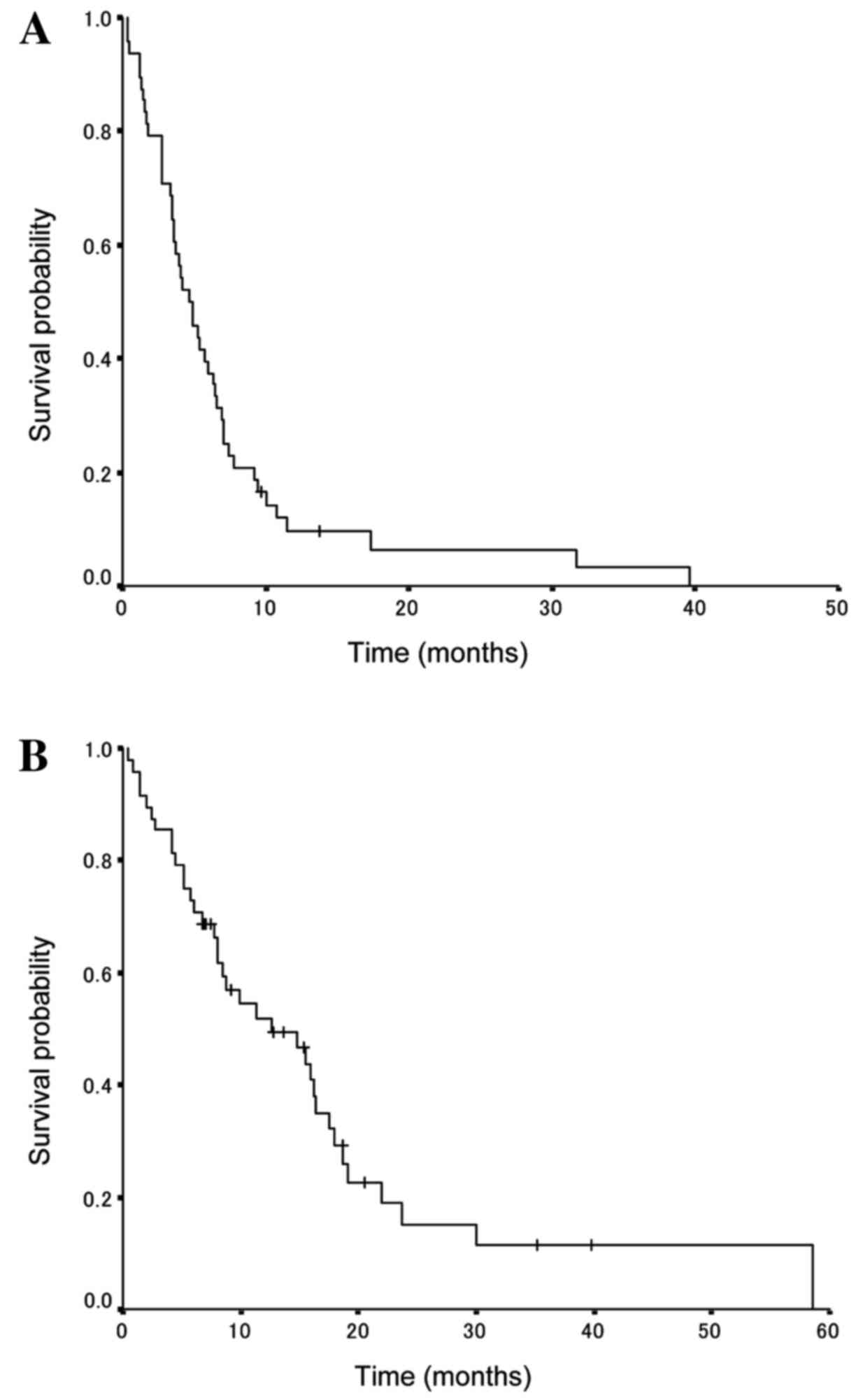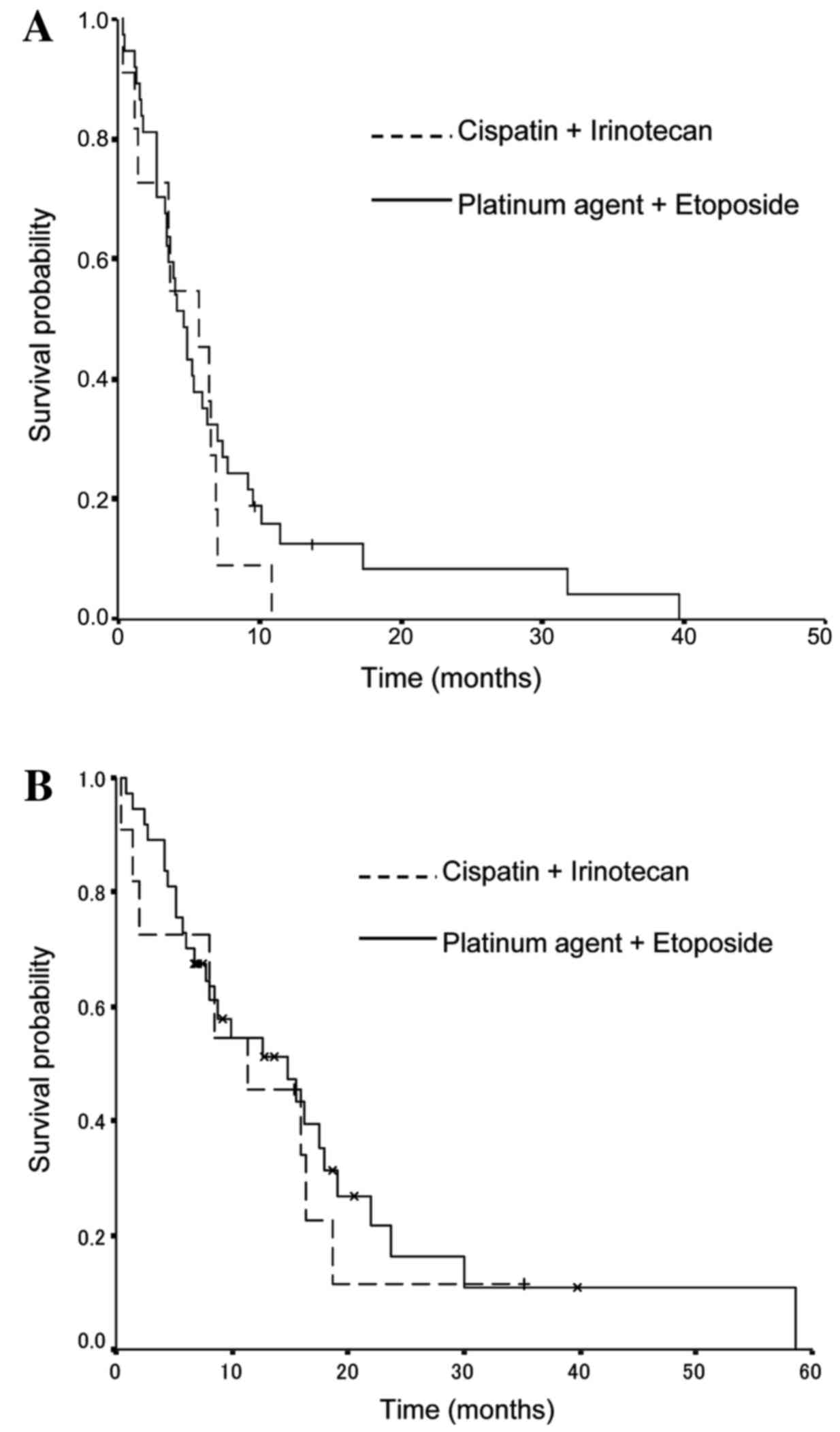|
1
|
Jackman DM and Johnson BE: Small-cell lung
cancer. Lancet. 366:1385–1396. 2005. View Article : Google Scholar : PubMed/NCBI
|
|
2
|
Davies AM, Lara PN, Lau DH and Gandara DR:
Treatment of extensive small cell lung cancer. Hematol Oncol Clin
North Am. 18:373–385. 2004. View Article : Google Scholar : PubMed/NCBI
|
|
3
|
Noda K, Nishiwaki Y, Kawahara M, Negoro S,
Sugiura T, Yokoyama A, Fukuoka M, Mori K, Watanabe K, Tamura T, et
al: Irinotecan plus cisplatin compared with etoposide plus
cisplatin for extensive small-cell lung cancer. N Engl J Med.
346:85–91. 2002. View Article : Google Scholar : PubMed/NCBI
|
|
4
|
Schiller JH, Adak S, Cella D, DeVore RF
III and Johnson DH: Topotecan versus observation after cisplatin
plus etoposide in extensive stage small cell lung cancer: E7593-A
phase III trial of the Eastern Cooperative Oncology Group. J Clin
Oncol. 19:2114–2122. 2001.PubMed/NCBI
|
|
5
|
Stupp R, Monnerat C, Turrisi AT III, Perry
MC and Leyvraz S: Small cell lung cancer: State of the art and
future perspectives. Lung Cancer. 45:105–117. 2004. View Article : Google Scholar : PubMed/NCBI
|
|
6
|
Ishizumi K, Ohashi N and Tanno N:
Stereospecific total synthesis of 9-aminoanthracyclines:
(+)-9-amino-9-deoxydaunomycin and related compounds. J Org Chem.
52:4477–4485. 1987. View Article : Google Scholar
|
|
7
|
Noda T, Watanabe T, Kohda A, Hosokawa S
and Suzuki T: Chronic effects of a novel synthetic anthracycline
derivative (SM-5887) on normal heart and doxorubicin-induced
cardiomyopathy in beagle dogs. Invest New Drugs. 16:121–128. 1998.
View Article : Google Scholar : PubMed/NCBI
|
|
8
|
Nogami N, Kiura K, Takigawa N, Harita S,
Chikamori K, Shibayama T, Tabata M, Hotta K, Shinkai T and Tanimoto
M: A phase II trial of combination chemotherapy with topotecan and
amrubicin in small cell lung cancer (SCLC). J Clin Oncol.
28:(Suppl). 70542010.
|
|
9
|
Inoue A, Sugawara S, Yamazaki K, Maemondo
M, Suzuki T, Gomi K, Takanashi S, Inoue C, Inage M, Yokouchi H, et
al: Randomized phase II trial comparing amrubicin with topotecan in
patients with previously treated small-cell lung cancer: North
Japan Lung Cancer Study Group Trial 0402. J Clin Oncol.
26:5401–5406. 2008. View Article : Google Scholar : PubMed/NCBI
|
|
10
|
Kaira K, Sunaga N, Tomizawa Y, Yanagitani
N, Shimizu K, Imai H, Utsugi M, Iwasaki Y, Iijima H, Tsurumaki H,
et al: A phase II study of amrubicin, a synthetic
9-aminoanthracycline, in patients with previously treated lung
cancer. Lung Cancer. 69:99–104. 2010. View Article : Google Scholar : PubMed/NCBI
|
|
11
|
Onoda S, Masuda N, Seto T, Eguchi K,
Takiguchi Y, Isobe H, Okamoto H, Ogura T, Yokoyama A, Seki N, et
al: Phase II trial of amrubicin for treatment of refractory or
relapsed small-cell lung cancer: Thoracic Oncology Research Group
Study 0301. J Clin Oncol. 24:5448–5453. 2006. View Article : Google Scholar : PubMed/NCBI
|
|
12
|
Hasegawa Y, Takeda K and Kashii T:
Clinical experience of amrubicin hydrochloride (Calsed) monotherapy
in previously treated patients with small-cell lung cancer. Jpn J
Lung Cancer. 45:811–815. 2005. View Article : Google Scholar
|
|
13
|
Hirose T, Shirai T, Kusukoto S, Sugiyama
T, Yamaoka T, Okuda K, Ohmori T, Ohnishi T and Adachi M: Showa
University School of Medicine, Tokyo, Japan: Phase II study of
amrubicin and carboplatin in patients with the refractory or
relapsed small cell lung cancer (SCLC). J Clin Oncol.
28:S152010.
|
|
14
|
Eisenhauer EA, Therasse P, Bogaerts J,
Schwartz LH, Sargent D, Ford R, Dancey J, Arbuck S, Gwyther S,
Mooney M, et al: New response evaluation criteria in solid tumours:
Revised RECIST guideline (version 1.1). Eur J Cancer. 45:228–247.
2009. View Article : Google Scholar : PubMed/NCBI
|
|
15
|
Gupta RS, Gupta R, Eng B, Lock RB, Ross
WE, Hertzberg RP, Caranfa MJ and Johnson RK: Camptothecin-resistant
mutants of Chinese hamster ovary cells containing a resistant form
of topoisomerase I. Cancer Res. 48:6404–6410. 1988.PubMed/NCBI
|
|
16
|
Sugimoto Y, Tsukahara S, Oh-hara T, Isoe T
and Tsuruo T: Decreased expression of DNA topoisomerase I in
camptothecin-resistant tumor cell lines as determined by a
monoclonal antibody. Cancer Res. 50:6925–6930. 1990.PubMed/NCBI
|
|
17
|
Sugimoto Y, Tsukahara S, Oh-hara T, Liu LF
and Tsuruo T: Elevated expression of DNA topoisomerase II in
camptothecin-resistant human tumor cell lines. Cancer Res.
50:7962–7965. 1990.PubMed/NCBI
|
|
18
|
Tan KB, Mattern MR, Eng WK, McCabe FL and
Johnson RK: Nonproductive rearrangement of DNA topoisomerase I and
II genes: Correlation with resistance to topoisomerase inhibitors.
J Natl Cancer Inst. 81:1732–1735. 1989. View Article : Google Scholar : PubMed/NCBI
|
|
19
|
Murakami H, Yamamoto N, Shibata T, Takeda
K, Ichinose Y, Ohe Y, Yamamoto N, Takeda Y, Kudoh S, Atagi S, et
al: A single-arm confirmatory study of amrubicin therapy in
patients with refractory small-cell lung cancer: Japan Clinical
Oncology Group Study (JCOG0901). Lung Cancer. 84:67–72. 2014.
View Article : Google Scholar : PubMed/NCBI
|
|
20
|
Hirukawa I, Yokoyama T, Hirata A, Takata
S, Ishii H and Takizawa H: A retrospective study of amrubicin
treatment in patients with relapsed small-cell lung cancer. Jpn J
Lung Cancer. 5:3812014.
|
|
21
|
Sudo J, Tsuzuki H, Takahashi S, Yamane Y,
Kurimoto F and Sakai H: Second-line chemotherapy for relapsed
small-cell lung cancer. Nihon Kokyuki Gakkai Zasshi. 3:2332014.
|
















